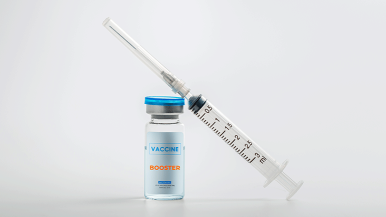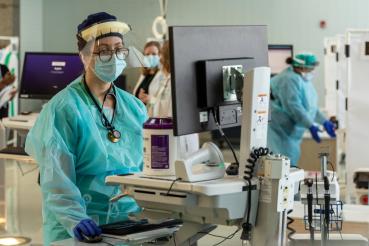Following much debate among public health experts about the benefits of another COVID-19 booster, the U.S. Food and Drug Administration has authorized second boosters of the mRNA vaccines (made by Pfizer-BioNTech or Moderna) as an option for people ages 50 and older. The Centers for Disease Control and Prevention also updated its guidance to expand eligibility for a second booster, given at least four months after the first booster, for those ages 50 and up.
We asked Michael Lin, MD, MPH, an infectious disease specialist and associate professor at RUSH University Medical Center, to offer his insights on the booster debate leading up to this week’s decision.
Why don’t all experts agree on whether we need another COVID-19 booster?
One issue driving the recent controversy over boosters is that not all public health officials have the same goals regarding vaccination, Lin says.
Most would agree that the primary goal of the vaccines is to keep people from developing severe COVID-19 that could lead to hospitalization or death, Lin says. Based on that metric, the vaccines seem to be maintaining their effectiveness for most people. Data shows the Pfizer-BioNTech and Moderna vaccines appear to be 78% effective at preventing hospitalization from COVID-19 four months after a third dose.
Yet some public health experts also believe that another goal of the vaccines is to prevent any infection with SARS-CoV-2 (the virus that causes COVID-19) in the hopes of slowing down — or even stopping — transmission in the community. On that front, the vaccines have been less effective. “We have seen waning immunity to any infection, including mild infection, especially this past winter when the delta wave ended and the omicron wave began,” Lin says. “That is why many people are recommending another booster.”
Lin says experts on both sides of the argument have valid points. “They just have different priorities,” he adds.
When would be the best time to get another booster?
Some public health officials wanted to get the option of a second booster for those 50 and older authorized ahead of another potential surge, especially as the BA.2 omicron subvariant continues to spread.
“With the omicron wave, it appeared that the effectiveness of the booster at preventing infection was most apparent in the one to two months after the booster was given. After that, the effectiveness started to wane, at least for the omicron variant,” Lin says. “So, it makes sense to push for boosters at the beginning of a wave, rather than at the end of a wave when there are low rates of transmission in the community.”
Who else is eligible for a second booster of an mRNA vaccine?
The CDC recommends that people ages 12 and older with weakened immune systems receive three full doses of an mRNA vaccine as part of their primary series. They may also now receive a second booster, for a total of five shots.
“That advice reflects the idea that immunocompromised people have a harder time making protective antibodies,” Lin says.
When can we get another COVID-19 booster?
If you are eligible, you may schedule your second booster now at a pharmacy or clinic near you.
Will yearly COVID-19 boosters be needed?
Lin thinks it’s possible that yearly boosters could be recommended at some point to protect against COVID-19. As epidemiologists at RUSH and elsewhere collect more infection data in the coming months, public health officials will have more information on which to base their recommendations for the next cold and flu season.
“In the future, there could be a recommendation for a yearly booster that’s tailored to the circulating strains,” Lin says. “That’s not just because our immunity against the SARS-CoV-2 virus wanes after time, but also because the virus is always changing and evolving into new variants.”
Are you due for a COVID-19 vaccine booster? Check this schedule to find out if the time is right.




